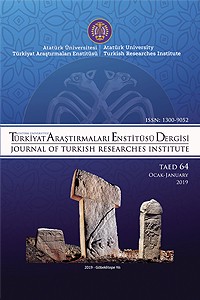Abstract
Chingiz Aitmatov's book entitled Mother Earth, published in 1963, is one of the important works of him, in which people are addressed to with the forms of relationships they establish with the earth and their commitment to it. Handles a Kyrgyz woman Tolgonay who sent her husband and three sons into the battle fields during World War II, her relationship with earth through her faith in life and determination to struggle. Earth is in a position that she considers as a precursor. She cultivates it and calls it Mother Earth. Protective and omniscient power of earth, which is personalized and finds voice in the novel, shows Tolgonay’s, accordingly Kyrgyz people’s view of nature and its elements. Nature, when a relationship is established with it without degrading or subordinating it, is able to provide human beings all required material and non-material powers, and it can make them feel their presence and vitality. Thus, existence of nature is not positioned in the novel as less valuable than existence of human beings.
Both the nodus and the settlements of the novel will be handled according to relationships between primitive life and nature, which are suggested by Claude Lévi-Strauss in his work entitled The Savage Mind. It will be revealed that, despite all the deprivations caused by the war, the survival struggle and hope of the human being are closely related to the approach of human beings to the nature. Hence, as a woman, Tolgonay's equitable relationship with the land gives her the courage and wisdom to resist many cultural stereotypes and sexist regimes. In this context, primary reason of frustration of the modern attitude, which shreds and categorizes, must be searched at the condescending distance that it places towards nature.
References
- Aytmatov, Cengiz. (1995) . Toprak Ana. (Çev: Refik Özdek) . İstanbul: Ötüken Yayınları. Akmataliyev, Abdıldacan. (1998) . Cengiz Aytmatov’un Dünyası, Ankara: Atatürk Kültür Merkezi Başkanlığı Yayınları. Durmuş, Mitat. (2009) . “Yıldırım Sesli Manasçı’da Anlatı Kahramanının ‘Mitik Sese’ Dönüşümü”, Cengiz Aytmatov Prestij Kitabı) , Ankara: T.C. Kültür ve Turizm Bakanlığı Yayınları, 209-223. Durmuş, Mitat. (2014) . “Cengiz Atmatov’un Yüzyüze ve Oğulla Buluşma Öykülerinde Dramatik / Trajik Unsurların İzleksel Görünümleri”, Yeni Türk Edebiyatı Araştırmaları, 12, 117-124. Kolcu, Ali İhsan. (2015) . Bozkırdaki Bilge, Erzurum: Salkımsöğüt Yayınları. Korkmaz, Ramazan. (1999) . “Cengiz Aytmatov’un Romanlarında Kaostan Düzene Ev/Anne ve Çevre/Dünya İzleği”. Bilig, 9, 53-62. Korkmaz, Ramazan. (2008) . “Aytmatov Anlatılarında Aşkın Eriştirici ve Dönüştürücü Gücü”. Bilig, 46, 1-6. Mifı Narodov Mira. (1987) . “Baba Dehkan”. Dünya Halkları Mitleri Ansiklopedisi, Cilt I, Moskova, s. 176. Paglia, Camille. (2014) . Cinsel Kimlikler Nefertiti’den Emily Dickinson’a Sanat ve Çöküş. Ankara: Epos Yayınları. Pirverdioğlu, Ahmet. (2002) . “Türklerde Yılbaşı ve Bahar Geleneği”. Türkler, Cilt 3, 44-50, Ankara: Yeni Türkiye Yayınları. Radloff, Wilhem. (1994) . Sibirya’dan Seçmeler 2, İstanbul: Milli Eğitim Bakanlığı Yayınları. Strauss, Claude Lévi. (2016a) . Yaban Düşünce. (Çev. Tahsin Yücel) . İstanbul: Yapı Kredi Yayınları. Strauss, Claude Lévi. (2016b) . Hüzünlü Dönenceler. (Çev. Ömer Bozkurt) , İstanbul: Yapı Kredi Yayınları.
Abstract
References
- Aytmatov, Cengiz. (1995) . Toprak Ana. (Çev: Refik Özdek) . İstanbul: Ötüken Yayınları. Akmataliyev, Abdıldacan. (1998) . Cengiz Aytmatov’un Dünyası, Ankara: Atatürk Kültür Merkezi Başkanlığı Yayınları. Durmuş, Mitat. (2009) . “Yıldırım Sesli Manasçı’da Anlatı Kahramanının ‘Mitik Sese’ Dönüşümü”, Cengiz Aytmatov Prestij Kitabı) , Ankara: T.C. Kültür ve Turizm Bakanlığı Yayınları, 209-223. Durmuş, Mitat. (2014) . “Cengiz Atmatov’un Yüzyüze ve Oğulla Buluşma Öykülerinde Dramatik / Trajik Unsurların İzleksel Görünümleri”, Yeni Türk Edebiyatı Araştırmaları, 12, 117-124. Kolcu, Ali İhsan. (2015) . Bozkırdaki Bilge, Erzurum: Salkımsöğüt Yayınları. Korkmaz, Ramazan. (1999) . “Cengiz Aytmatov’un Romanlarında Kaostan Düzene Ev/Anne ve Çevre/Dünya İzleği”. Bilig, 9, 53-62. Korkmaz, Ramazan. (2008) . “Aytmatov Anlatılarında Aşkın Eriştirici ve Dönüştürücü Gücü”. Bilig, 46, 1-6. Mifı Narodov Mira. (1987) . “Baba Dehkan”. Dünya Halkları Mitleri Ansiklopedisi, Cilt I, Moskova, s. 176. Paglia, Camille. (2014) . Cinsel Kimlikler Nefertiti’den Emily Dickinson’a Sanat ve Çöküş. Ankara: Epos Yayınları. Pirverdioğlu, Ahmet. (2002) . “Türklerde Yılbaşı ve Bahar Geleneği”. Türkler, Cilt 3, 44-50, Ankara: Yeni Türkiye Yayınları. Radloff, Wilhem. (1994) . Sibirya’dan Seçmeler 2, İstanbul: Milli Eğitim Bakanlığı Yayınları. Strauss, Claude Lévi. (2016a) . Yaban Düşünce. (Çev. Tahsin Yücel) . İstanbul: Yapı Kredi Yayınları. Strauss, Claude Lévi. (2016b) . Hüzünlü Dönenceler. (Çev. Ömer Bozkurt) , İstanbul: Yapı Kredi Yayınları.
Details
| Primary Language | Turkish |
|---|---|
| Journal Section | Makaleler |
| Authors | |
| Publication Date | January 31, 2019 |
| Published in Issue | Year 2019 Issue: 64 |

